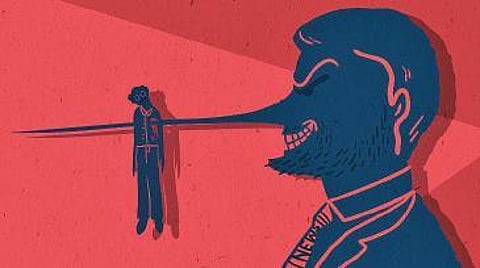

KOCHI: In this era of social media and ‘fake news’, uncertainty and distrust have pushed Covid-19, from a serious pandemic to a global pandemonium! As many sit isolated in their homes, their phone and the internet seem to be their only salvation. And given our propensity to texting and surfing, many are increasingly relying on unfiltered information and “forwards” from well-meaning friends and relatives.
According to Newsguard, a service that rates the credibility and transparency of web news, a vast majority of coronavirus information shared across social media comes from fake news sites and said that since the Covid-19 outbreak, the list of websites with false or misleading content has increased from 31 to 106 in the US & Europe alone.
To underline the seriousness of how much misinformation is getting filtered through to the public, it also said that over the last 90 days, websites of the US Center of Disease Control and the World Health Organisation – which are sources of reliable information –received 364,483 “engagements” or likes, shares and comments while 76 other sites (identified by NewsGuard as sites which had misleading content) had a combined engagement of 52,053,542—142 times more than the two reliable public health websites!In India, the download of information often includes unsolicited “cures” and “meds” being touted for the virus, to regular updates on new cases and deaths. While such trash can be ignored, we need to be alert about the rise of coronavirus-themed phishing attacks and be vigilant about two types of misinformation that regularly pops into our mailboxes or phones.The first is an increased slandering of certain countries and communities or certain lifestyles and pinning that as the sole reason for the pandemic.
A case in point is the recent comment by a well-known cricketer from Pakistan who blamed China for ‘putting the world at stake’ with their eating habits! While this could, at normal times, maybe simply ignored or even pushed back by stating that one man’s meat is another man’s poison, in troubled times like the present, accusations about the food habits and lifestyles in certain countries paired with conspiracy theories about the origin of the virus only adds to the chaos and misinformation.Several knee-jerk responses are compelled by this collecting mound of misinformation and some actually give impetus to actions that have a direct impact on trade and livelihoods.
One small example is the culling of chickens on largescale in some states like Kerala or in cities like Hyderabad where chicken retail owners admit that their business has plummeted like never before despite the Animal Husbandry Commissioner stating that poultry is not found to be involved in the transmission of Covid-19 to humans. Indeed poultry has not been found to be involved in the transmission of Covid-19 to humans so far in any report.
Snowballing of misinformation also fuelled conspiracy theories of “bio-warfare gone wrong” or touting it as ‘a man-made virus’.The other type of information that could be dangerous is the host of medications being touted as a preventive or cure. While these could range from the harmless haldi or neem to untested indigenous medicines or even ibuprofen (which as per some reports have been criticised by NHS as a treatment option for Covid-19) such ‘self-cures’ would not just compound the problem but also induce a sense of bravado thereby leading to lowering of much-needed safeguards.
The buck stops with you
It is a difficult time and given the many unknowns, reliable information is the first casualty. With more countries reporting new cases and deaths and many reacting by issuing drastic travel restrictions and strict quarantine measures, the situation is bound to be chaotic.However, responsible sharing like responsible reporting is the responsibility of the person who shares or files that news. These are troubling times and while it is understandable to experience some anxiety about protecting oneself and one’s family, we need to desist from getting phobic and more importantly, from spreading information that is not correct by blindly forwarding posts that incite fear or bias.